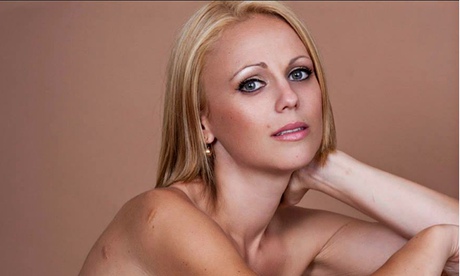
How radical and provocative is an honest image of a woman's body? Beth Whaanga, a mother of four from Brisbane, Australia, is finding out after posting images on Facebook of her body following surgery for breast cancer late last year. Taken by Nadia Masot, the pictures are brilliantly direct, documenting Whaanga's ongoing hair loss, total bilateral mastectomy, navel reconstruction and hysterectomy scar. Whaanga lost more than 100 friends on Facebook after posting the pictures – and then they went viral. A registered nurse, she describes herself as a "breast cancer preventer", and hopes to make people more aware of the physical changes that might signal a problem.
Part of the raw power of these photos comes from their place within a culture in which bodies, particularly women's bodies, are so rarely depicted honestly. On Sunday it was announced that Getty Images and Sheryl Sandberg's Lean In organisation have joined forces to challenge some of the biases in visual culture, with a collection of stock images eschewing gender stereotypes. Rather than show professional women in 80s power suits, for instance, with baby under one arm, briefcase under the other, we see women as surgeons, soldiers and lifting weights.
It's a good idea, but works firmly within the bounds of what's expected: beautifully lit, posed by professionals. The images most likely to shift people's perspectives radically are those, like Whaanga's, which depict people candidly – and not sexualised, airbrushed or posed to perfection.
Over the past few years, a variety of projects have sought to do just this. They include The Scar Project, by photographer David Jay, which features survivors of breast cancer, often looking directly into the camera.
The Shape of a Mother blog and Jade Beall's A Beautiful Body project both show the reality of women's bodies after giving birth – the stretchmarks and puckering a powerful corrective to the question posed about the Duchess of Cambridge, immediately after she gave birth last year: what diet should she be starting now? Beall has also taken hundreds of images of women breastfeeding, while Gabi Gregg's "fatkini" gallery shows fat women, confident in swimwear, and some NSFW (not safe for work) projects that show ordinary people naked, in images designed to counter idealised mainstream depictions of nudity.
Speaking to a feminist punk singer a few years back, I asked about the press photos taken of her, mid-performance, red-faced and sweating. Did they bother her? "No," she said, "because that's how I look." That shouldn't be radical, but in the visual culture we've created, it is. Whaanga's photos are all the more powerful, impressive and potentially influential as a result.

